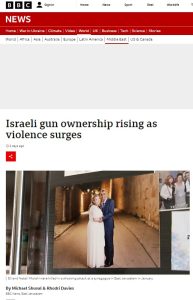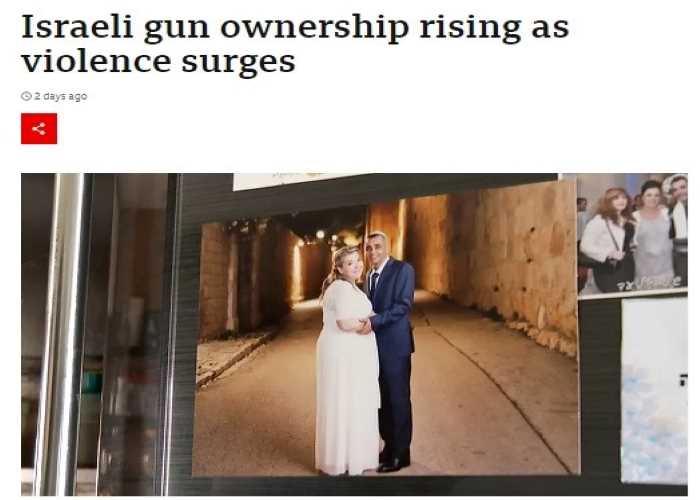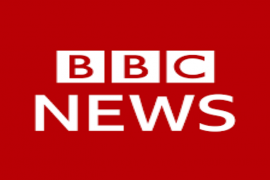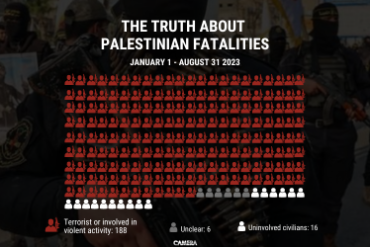On March 30th the BBC News website’s ‘Middle East’ page published a report by BBC Arabic’s Michael Shuval and Rhodri Davies (who are described as being located in “East Jerusalem”) titled “Israeli gun ownership rising as violence surges”.
The report begins by returning to the January 27th terror attack in Jerusalem’s Neve Ya’akov neighbourhood which is described as “a settlement in Israeli-occupied East Jerusalem that is considered illegal under international law, though Israel disputes this”. As was the case in BBC coverage of that shooting attack at the time, readers are not told that Neve Ya’akov was established in 1924 on land purchased by Jews but had to be abandoned when Jordan invaded Judea & Samaria and parts of Jerusalem in May 1948.
Later readers are told that:
“…violence between Palestinians and Israelis has been escalating since the first half of last year.
Palestinians have committed deadly attacks in Israeli cities and Israel’s army has carried out consistent nightly raids in the occupied West Bank. Last year saw Israeli security forces kill the most Palestinians since 2005. This year the violence has continued.”
No mention is made of the fact that the majority of the Palestinians killed by the Israeli security forces in 2022 were members of terrorist organisations and/or males carrying out terror attacks or engaged in violence at the time of their deaths.
Shuval and Davies go on:
“Following the January attack [in Neve Ya’akov], Mr Ben-Gvir pledged to drastically speed up the issuing of gun permits, from around 2,000 to 10,000 a month, reducing the waiting time from six to eight months to two or three.
Israeli gun ownership is low at about 2% of the population. It compares to about 30% of the population owning a gun in the US.
Usually citizens are allowed to hold a pistol and a limit of 50 bullets.
But now applications for gun licences have more than doubled, according to the national security ministry, from 19,000 in 2021 to 42,236 last year – the highest annual number made.”
The number of applications made of course does not necessarily reflect the number of licences eventually issued and BBC audiences (in contrast to readers of an AFP report on the same topic published days earlier) are not told anything about the eligibility, process and criteria for obtaining a gun licence in Israel and how that compares to other countries, for example England and Wales where the age limit for owning a registered firearm is considerably lower than in Israel.
One of the more curious parts of this article is an attempt to suggest correlation between Israeli civilians applying for gun licences and “youthful militias” – an interesting euphemism for terrorist groups such as the Lions’ Den – while blaming Israel for the fact that the Palestinian Authority has, for various reasons, lost or given up control over certain parts of the territory it administers.
“But people taking security into their own hands is also being increasingly seen in the occupied West Bank.
In the West Bank, unarmed self-defence groups and public committees are organising the defence of villages and towns, where Palestinian Authority forces are absent – often due to not having the necessary Israeli army co-ordination to operate. These civilians fear attacks by Jewish settlers, after successive examples in recent months.
New, youthful militias have emerged, becoming the latest wave of what Palestinians consider resistance to the Israeli occupation.”
Shuval and Davies end their report with quotes from a representative of a campaigning group which include promotion of unevidenced linkage between licenced firearms and violence in the Arab sector of Israeli society (confusingly for readers, portrayed as “Palestinian citizens”) and violence against Jewish and Arab (again, confusingly described as Palestinian) women.
“She adds that there is already rising gun violence in Israel, correlated with a rising number of licences, and the victims of which are principally Palestinian citizens, and a high proportion of women – both Jewish and Palestinian.”
Seeing as the BBC devoted quite a lot of coverage to the topic in 2021, Shuval and Davies should have been able to inform their readers that the violent crime in the Israeli Arab sector is mostly perpetrated using smuggled and stolen illegal weapons rather than licenced firearms. In contrast to the impression given to BBC audiences, there is no evidence to suggest that any of the eight women murdered since the beginning of 2023 were killed using licenced guns.
Related Articles:
AN UNHELPFUL BBC BACKGROUNDER ON ‘ISRAELI-PALESTINIAN VIOLENCE’





Jews want only to protect themselves from murdering terrorists supported by Iran – but this latest “report” implies that they are the aggressors. Typically dangerous garbage from the BBC – as ever.